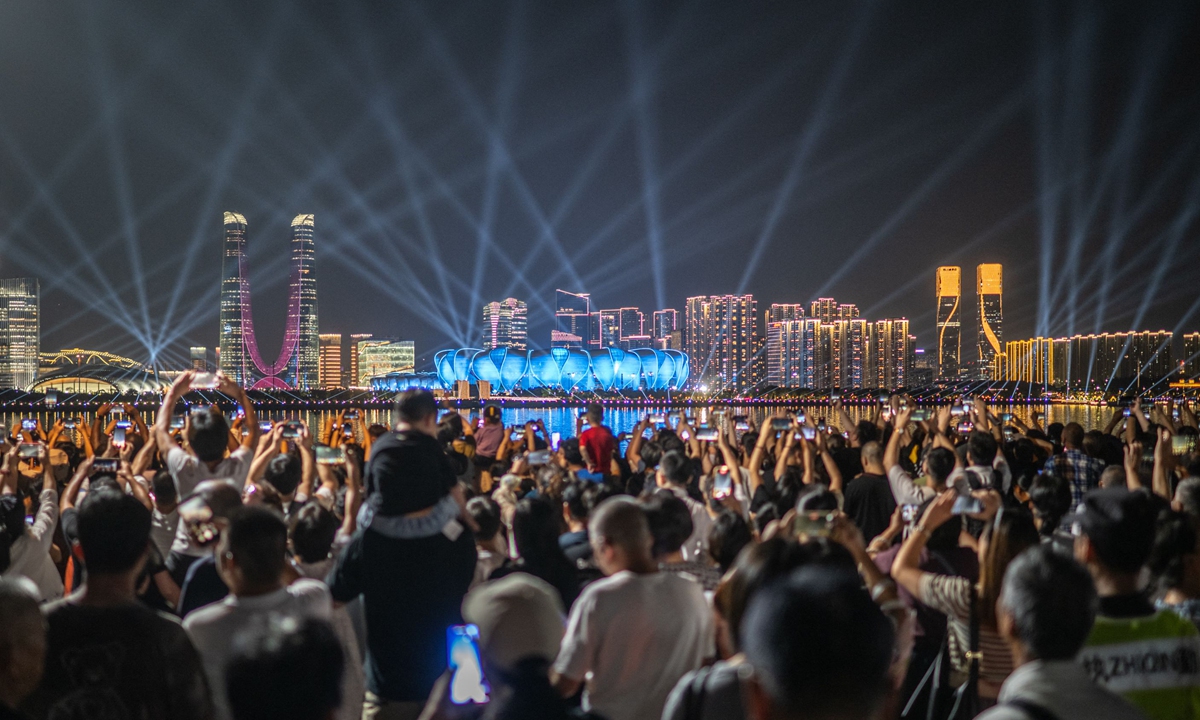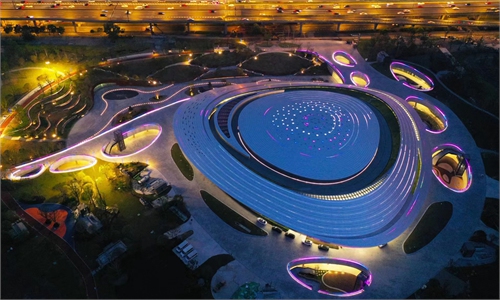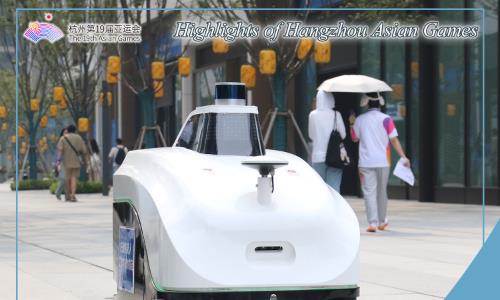19th Asian Games host city Hangzhou gets consumption boost, with gains for transportation, hotels, scenic spots, catering
Transportation, hotels, scenic spots, catering, shopping get boost

People gather at the promenade of Qiantang River to watch the light show of the Hangzhou Olympic Sports Centre Stadium (C), ahead of the 2022 Asian Games in Hangzhou in East China's Zhejiang Province on September 19, 2023. Photo: VCG
A wave of tourists and a marked rise in sporting goods orders have arrived in Hangzhou, as preparations for the 19th Asian Games enter the final phase.Chinese analysts said the Games will be a major boost for consumption-related sectors from sports and culture to catering for the host cities in East China's Zhejiang Province, the vibrant home of Chinese private-sector businesses, including the headquarters of such giants as Alibaba and Geely.
Hangzhou is expected to see the "most intense tourist wave" in recent years during the Games, with over 20 million tourists, the Securities Daily reported, citing a projection by the city's tourism authority.
Already, Hangzhou ranks among the top three cities in China in terms of tourism popularity during the upcoming eight-day Mid-Autumn Festival and National Day holidays, with travel orders on several online booking platforms up more than five times year-on-year, according to domestic news portal thepaper.cn on Tuesday.
"Bookings at our hotel have reached an all-time high," a manager at a Hangzhou hotel told the Global Times. People are coming for the Games, which fall during the "golden week" holidays.
Hotel rates at some Hangzhou hotels have more than doubled, a search by the Global Times found.
The effect of the massive tourist influx can already be felt, a Hangzhou resident surnamed Shen told the Global Times. "It is very hard to book plane and train tickets this week already."
On Chinese online travel agency Qunar, bookings for flights to Hangzhou during the Games are up 20 percent year-on-year, and hotel bookings have surged by 4.4 times over the same period in 2019, said a statement sent from the company to the Global Times on Wednesday.
The event is also lifting consumption in Hangzhou's surrounding cities. In the past week, searches for surrounding co-host cities Ningbo, Wenzhou, Huzhou, Shaoxing and Jinhua all doubled month-on-month. Zhejiang's bookings for bed-and-breakfast facilities rank second nationwide for the Mid-Autumn Festival and National Day holidays, said Qunar.
Pan Helin, a joint director of the Research Center for Digital Economics and Financial Innovation affiliated with Zhejiang University's International Business School, told the Global Times on Wednesday that the Games, the largest in history, will significantly drive up growth in the city's tourism and hotel industries.
The sports industry will also get a boost as the city hosts more sports events and other programs in the future, Pan said. "Also, the hosting of the Games has led to the further development of digitalization and smart industries so as to improve the city's public services, leading to more smart technologies being used in urbanization."
The Games' boost to consumption will contribute to the city's recovery process, which has already seen significant improvement from 2022.
In the first half of this year, Hangzhou received 53.23 million tourists, up 64.5 percent year-on-year, and tourism income totaled 91.5 billion yuan ($12.54 billion), up 65.3 percent, according to the Hangzhou tourism authority.
Yiwu, a global manufacturing hub and export center for small commodities, has also seen a boost in its orders as the Games fuel enthusiasm around Asia, with some vendors of football items saying orders are piled up through October.
From January to July 2023, Yiwu exported 4.21 billion yuan of sporting goods, up 24.6 percent year-on-year, according to Securities Daily, citing statistics from the Yiwu customs authority. Exports of sporting goods to Asian countries increased 12.7 percent year-on-year to 1.42 billion yuan.
In 2021, the Hangzhou municipal authority estimated that its investment in stadiums, airports and mass transit projects for the Asian Games had driven up its GDP by 414.1 billion yuan, or 7.6 percent of total GDP during the period from 2016-20.




